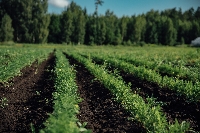December 5 marks World Soil Day around the world. This has been called for by the United Nations (UN) since 2013. Soil is a very important, but often underestimated and unnoticed natural resource - it makes a significant contribution to human food supply, water circulation and treatment, flood risk reduction, etc.
This year, on World Soil Day, special emphasis is placed on reducing soil erosion. According to the Food and Agriculture Organisation's report on soil erosion (2019), despite nearly a century of research and efforts, erosion remains the greatest threat to soil and its ecosystem services, including food security, in many parts of the world. That is why this year's World Soil Day pays special attention to the preservation of healthy soil ecosystems, calling on organizations, national and municipal institutions, as well as the population to get involved in improving soil health.
According to the data of the Ministry of Agriculture, 15.4% of Latvia's arable land is subject to water erosion and 9.3% to wind erosion. Within the framework of the project “LIFE CRAFT: Climate-responsible agriculture in Latvia”, the Latvian Fund for Nature tests and implements agricultural methods that are not only climate-friendly, but also reduce soil erosion. For example, the direct sowing method, which in cooperation with the Latvian Rural Advisory and Training Centre, is tested on 10 farms within the project, significantly reduces water erosion, almost completely eliminates wind erosion and completely eliminates soil agro-technical soil erosion caused by field plowing.
The LIFE CRAFT Latvian Fund for Nature is implementing the project for the second year. Its aim is to test and practically demonstrate in Latvia agricultural practices that reduce greenhouse gas emissions, which at the same time reduces carbon emissions and ensures the economic sustainability of farmers. Within the framework of the project, in cooperation with farms, three methods are tested and evaluated - direct sowing, incorporation of bio-carbon into the soil and controlled drainage.
